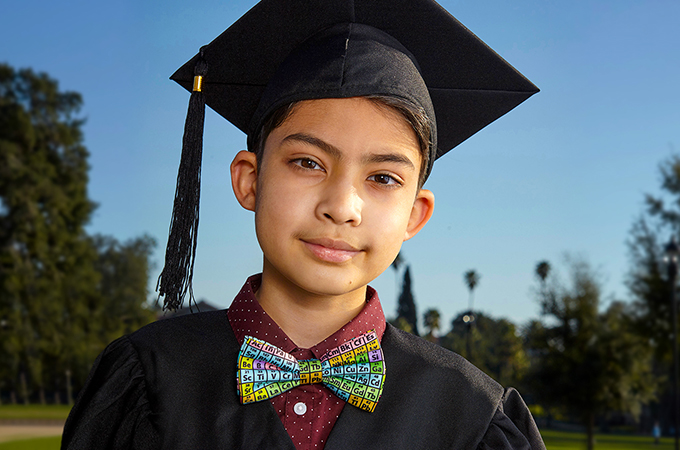On the evening of Feb. 23, just hours after her inauguration as the 12th president of the University of Redlands, President Krista L. Newkirk beamed with pride as she looked across the Quad.
Facing hundreds of students, alumni, faculty, staff, and friends, Newkirk shared an exciting announcement—the Forever Yours campaign, the most ambitious and far-reaching fundraising effort in the University’s history, had exceeded its original fundraising goal of $200 million. With a record $207,159,850 in gifts and commitments, Forever Yours marks a significant philanthropic milestone for the institution, and Bulldogs will feel the ripple effects for years to come.
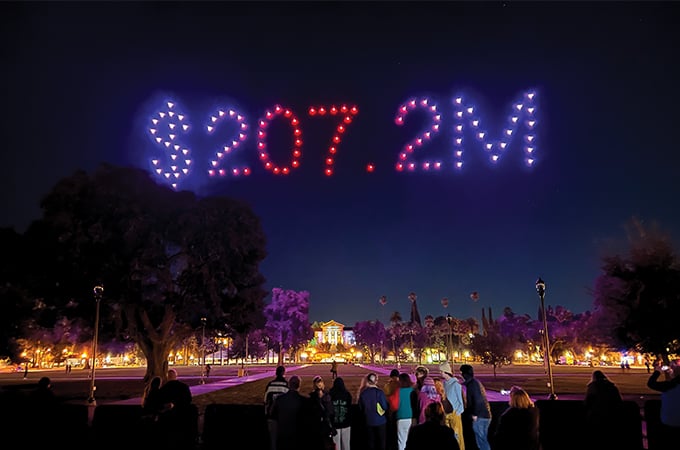 “This monumental support will benefit our University today, tomorrow, and forever, ensuring life-changing opportunities for our current and future students,” says Newkirk. “For all of those who gave, I want to sincerely and personally thank you. You have left a legacy of love and support that will positively impact future generations.”
“This monumental support will benefit our University today, tomorrow, and forever, ensuring life-changing opportunities for our current and future students,” says Newkirk. “For all of those who gave, I want to sincerely and personally thank you. You have left a legacy of love and support that will positively impact future generations.”
The stories in this issue of Och Tamale honor the many ways these generous contributions directly benefit our students, our alumni, and our future—making it Forever Ours.
Scholarship Promise
‘The moment I knew I was going to attain my goal’
When Stephen Kredel ’22 completed his service in the U.S. Army, he set his sights on a college education—and already had the University of Redlands in mind. “One of the reasons I joined the military was so I could attain a debt-free college degree,” says Kredel, who transferred to the University from Crafton Hills College, a community college in Yucaipa, California.

Growing up locally, Kredel remembers driving through campus and attending the University’s Fourth of July fireworks. “At first, the U of R felt out of reach, but I applied anyway.” When he received his acceptance letter, Kredel learned he had received generous financial aid from the University, including the Laura Dangermond Endowed Scholarship. He was ecstatic. “[Paired with the GI Bill], I knew then I was going to achieve my goal of attending Redlands, a top-tier university.”
As a student, Kredel appreciated the Office of Military and Veteran Services, which helped him communicate with the United States Department of Veterans Affairs. “Whenever I had a question, they always had the answer or pointed me in the right direction.”
In mid-January, he began his new career as a technical writer at Esri, the geographical information systems company founded by his scholarship donors, Jack and Laura Dangermond. “I am taking my love and passion for writing and turning it into a profession,” says Kredel, who dreams of writing historical fiction or science fiction. “My life had humble beginnings, and I didn’t know if attending a university of this caliber was a realistic dream. But I achieved it because of the donors who provided scholarships like mine.”
‘This support is core to our company’s culture’
When Rockette Ewell started in banking 35 years ago, she only knew one thing for certain—she wanted to make the world a better place. Luckily, a supervisor set her on a path in community reinvestment and corporate social responsibility early in her career—and it changed her life. Ewell is now the vice president and community affairs manager for Southern California at U.S. Bank, and she says, “I recognized this is what I should be doing, and I’ve been doing it ever since.”
Ewell is proud of U.S. Bank’s commitment to serving the military and veterans through their foundation giving and hiring practices. “This support is core to our company’s culture,” she adds. “A key component is being able to invest in spaces that help underwrite access to education, particularly for those communities that might have barriers to getting there.”
U.S. Bank has been supporting scholarships and programming for military and veteran students at the U of R since 2017, and Ewell appreciates the University’s thoughtful approach to their partnership. “The collaboration has been an ongoing conversation. It takes into account where we can have an impact and where the University sees a need we can meet. You can’t ask for a better relationship than that.”
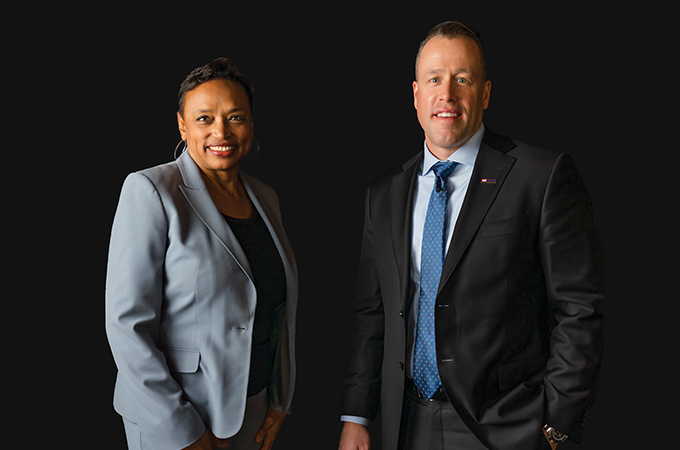
Jeffrey Lewis, senior vice president of consumer and business banking for the Inland Empire, says U.S. Bank’s community involvement through employee volunteerism and foundation grantmaking is one of the best parts of his job. “I was born and raised in the Inland Empire, so I’m passionate about making sure that our communities thrive.”
U.S. Bank also partners with the University to offer the popular Money Matters financial education series that resumes this spring (visit www.redlands.edu/moneymatters for details).
Personalized Education
‘Can’t help but give 100 percent’
As an undergraduate, Professor Bryce Ryan originally planned to attend medical school, but a volunteer opportunity at a local hospital changed his mind. “I realized I did not want to be in a clinical setting, but rather, in a classroom, and I was not on the right path,” says Ryan, who joined the University’s faculty in 2008. “I started making career choices to end up at a place like Redlands.”
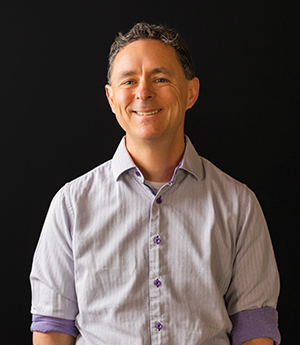
Ryan recalls a student who, like him, entered the University on the pre-med track, but took an ecology course and discovered he wanted to be a field biologist. “At another school, he would have been pushed down his initial pathway,” says Ryan, who holds a Ph.D. in zoology from North Carolina State University. “But at Redlands, he learned he had a true passion.”
Assuming the Stauffer directorship in 2020 has led Ryan to interact with a broader range of individuals on campus. “I saw on my first day that our students were amazing,” says Ryan, “but now I also see how incredibly dedicated to our students the faculty and staff are. They put in so much extra work and love.” Ryan says it’s this close interaction with students that draws a special type of person to Redlands faculty in the first place. “In this environment, you can’t help but give 100 percent.”
In addition to developing hands-on research opportunities for undergraduate students, Ryan wants to better serve the University’s growing diverse student population in the sciences. Ultimately, he hopes to recruit faculty from similarly diverse backgrounds and life experiences.
When reflecting on his time at Redlands, Ryan says he never gets tired of teaching, even after 14 years. “How lucky I am to still feel this way about my job.”
‘People who care about their communities’
When Doug Chaffee ’65 and Paulette Marshall Chaffee ’71 attended the University, several faculty members made a significant impact on their lives, including Professors Bob Morlan, Judson “Sandy” Sanderson, and Maury Durall.
“There was a great opportunity to explore the liberal arts,” says Doug, who volunteered in the Peace Corps after law school and now chairs the Orange County Board of Supervisors (representing the fourth district). “These experiences prepared me to pursue different avenues and created an awareness of the world.”
After U of R, Doug and Paulette were set up by their mothers, who both attended Fullerton Methodist Church. “Our mothers knew best,” says Doug with a smile. “The smartest thing I ever did was marry a Redlands graduate.”
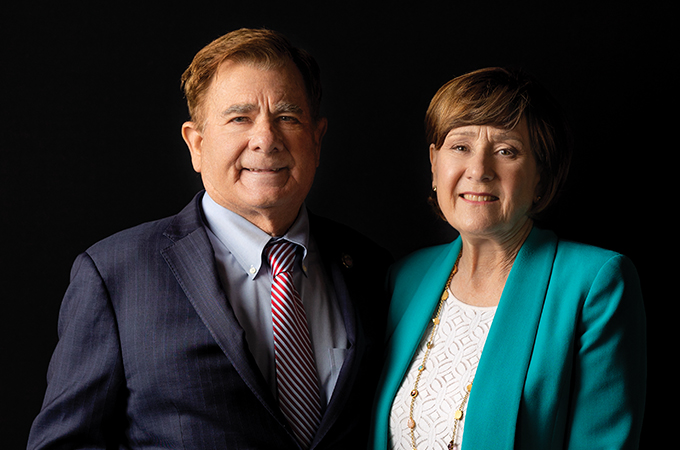
When their son, Marshall Chaffee ’10, selected U of R, the couple was excited to see the Redlands experience through his eyes. “Marshall’s experience was wonderful,” says Paulette, who served on the University’s parent advisory group. Doug recalls his son’s love of Outdoor Programs and his distinction as the outstanding senior in the sciences. “He was able to participate in research at Redlands,” Paulette recalls, “and his work on the mass spectrometer distinguished him among his graduate school classmates at University of Virginia.”
Doug and Paulette feel strongly about the need for environmental sciences in today’s world, while acknowledging the contributions of related fields to this area. “Such a discipline requires important policy conversations and science-based decisions,” says Doug. The couple has established an endowed chair, which they hope will not only inspire more students to pursue this field but also help the University recruit outstanding talent.
Says Doug, “We need people who care about their communities and want to make the world a better and safer place.”
Experiential Learning
Part of something bigger
While on a road trip to look at colleges, Gabby Rockwood ’24 knew tennis would be a significant consideration in her decision. “I wanted to play for a Division III school. It’s very fun and allows me to appreciate the sport more.”
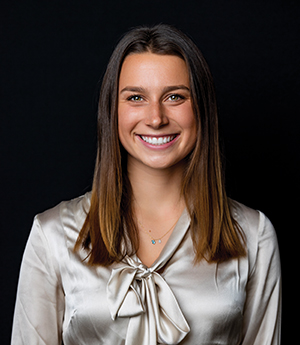
Her parents, Richard Rockwood ’92 and Lesley Kearney-Rockwood ’94, attended the University, so Redlands already felt like home. But the handwritten letters she received from former Head Tennis Coach Geoff Roche ’96 ultimately made up her mind. “I knew he wanted me to play at Redlands.”
A studio art major, Gabby considers her experience with Bulldog tennis among the best times of her life. The exhilarating tournaments and matches make her feel part of something bigger, but she knows the influence of her relationships will last long after graduation: “Teammates, coaches, alumni, and even those I am playing against have helped me become a better person.”
Attending Tennis Alumni Day also brought home this perspective, she says, “Seeing those who came before reminded me that it’s not just about winning or losing.”
Gabby is also excited for the construction of the University’s new tennis center, which will be named after U of R tennis coach Jim Verdieck. “The Center combines our shared love of tennis,” she says of Verdieck’s legacy, adding, “I can’t wait to share it with our community, says Gabby, and knows the Center will be a huge draw for recruiting new students. “I feel so lucky to be playing during the facility’s first years.”
‘Providing opportunities as fulfilling as ours’
Husband and wife Brian Murphy ’04 and Kerri Hatfield ’04 know firsthand the lasting impact of Bulldog tennis, as well as the opportunities provided by traditions, such as Community Service Learning (CSL), Greek life, and student government. As first-year student-athletes, their connection blossomed during courtside conversations and over smoothies and chicken tenders at the Plaza Café.
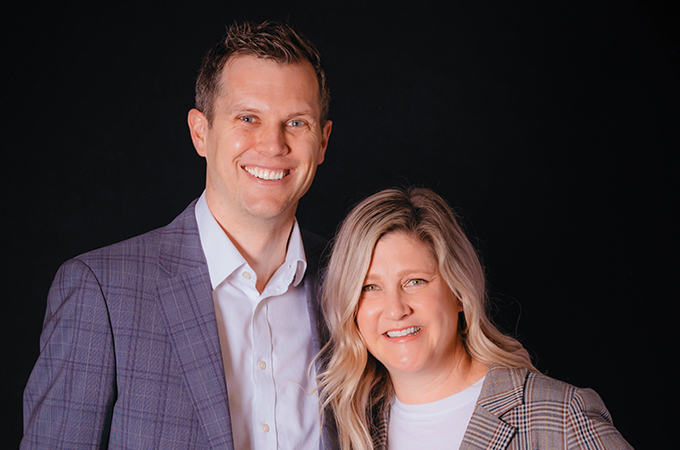
“We both share this feeling that the University provides opportunities that encourage leadership and holistic experiences,” says Murphy, president and managing director at Meridian Capital, a Seattle-based investment firm.
Hatfield, who pursued a career in higher education, recalls “incredibly eye-opening” CSL classes that included building homes with Habitat for Humanity and an overnight stay at Union Rescue Mission, inspiring the couple’s desire to give back. “U of R fosters a balance between academics and experiential learning,” says Hatfield. “It helped me connect the dots, whether by navigating challenging situations or compromising with peers.”
Murphy, now a U of R trustee and member of the Tennis Campaign Committee, adds, “I have found that the ability to work with and learn from people of different backgrounds is as important as any skill in the real world. Experiences outside the classroom and the leadership opportunities I had at Redlands made such a difference in learning how to do that.”
During the campaign, the couple supported the Verdieck Tennis Center and CSL. “Athletic facilities are important, especially since 25 percent of incoming students are recruited student-athletes,” says Murphy. Hatfield notes that CSL programs are not just valuable for students but for the entire community. “They build skills and professional experiences while also doing good.”
Ultimately, according to Murphy, “We want to continue providing opportunities as fulfilling as ours.”
Global Perspectives
‘Bringing the knowledge back home’
When Montserrat Pineda ’22 learned she had been selected as the inaugural recipient of the Vivanco-Daugherty Family Study Abroad Travel Grant, she was “honored beyond words.” Pineda, a first-generation student from Long Beach, California, felt supported by the U of R community in her decision to study away in London. “As the first recipient, I knew I was beginning a legacy.”
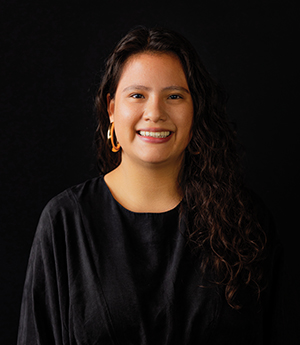
From the moment she exited Heathrow Airport, Pineda gained a new perspective from the vibrant city. As a student at Queen Mary University, she took classes on British feminist activism (alongside 50 other female students) and learned about the country’s policies, including its national health-care system. A political science major, Pineda selected this program to align with her professional goals, which include providing resources to marginalized groups through policy. “It was important to me to be able to bring the knowledge back home,” says Pineda.
Navigating a new city also helped Pineda learn about herself, as she gained independence and stepped outside her comfort zone. In addition to Poland and Italy, her travel highlights included visiting her namesake mountain monastery in Spain: “When I was younger, I learned about the origin of my name, and it was the place in the world I had dreamed of visiting.”
Pineda now continues her legacy by overseeing the first-gen ambassador program for the University’s Study Away Office. “I want students from backgrounds similar to mine to know that study away is possible,” she says. “I think being more inclusive in the way that we promote these programs can help us make other spaces on campus more inclusive as well.”
‘Creating global citizens’
Alumni Board President Mary Vivanco ’88 describes her abroad semester as “transformative” because it cultivated her love of travel. While living at Salzburg’s Haus Wartenberg in spring 1987, she recalls a saying scratched into an interior door that read, “The last day here is sooner than you think.”
“That sentiment and experience changed my philosophical view of life,” says Vivanco, also a University trustee. “I was following the footsteps of history, and a whole new world opened up that has had a long-lasting effect.” But her individual experience, including an interim travel class in English art and architecture, was not the only positive outcome she sees in studying away. “You come back a different person, and that increases the consciousness of the collective, creating global citizens.”
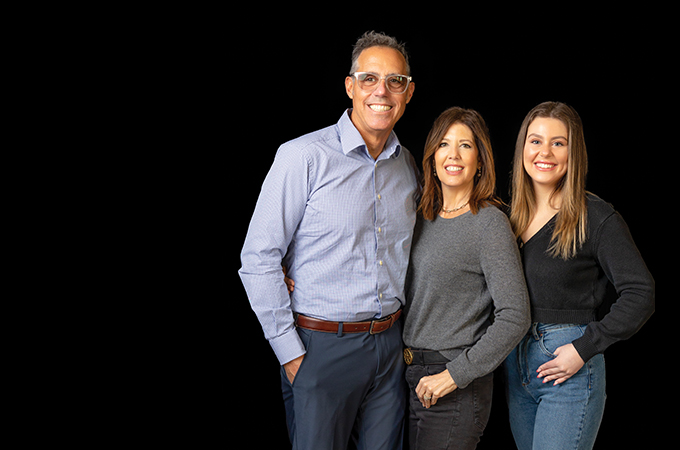
Travel is a value that Vivanco and her husband, Darrell Daugherty, have integrated into their family’s culture. Their daughter, Kate Daugherty ’23, a psychology major, says, “Sitting around the dinner table, we discussed where we wanted to go, and I could express my interests.” She remembers the family’s trip to Southeast Asia as growing her confidence and opening her eyes.
When Vivanco and Daugherty considered their campaign leadership gift, they included Kate and their son, Brendan Daugherty ’19, in the conversation. “They will be the ones to carry on the legacy,” says Vivanco. Daugherty’s sister, Kerrigan Daugherty ’04, also attended Redlands, and he is proud to be associated with the school. “We wanted our family’s gift to create unique travel experiences, especially for first-gen students.”
The family recently met Pineda, an experience that reaffirmed their decision to establish the Vivanco-Daugherty Family Student Abroad Travel Grant Endowment, which helps students with expenses related to study away, such as airfare and visas. “We knew we made the right decision,” says Daugherty.
Vivanco agrees. “We feel very lucky to participate, and meeting Montserrat propels us into more excitement for future recipients.”
Educational Innovation
‘Where change takes place’
Professor Yasuyuki “Yash” Owada was in Tokyo, Japan, when he received the invitation from Johnston College Chancellor Pressley McCoy to join the faculty in 1969. “I didn’t fully understand all of it at the time,” says Owada, who retired in 1999 after three decades of service to Johnston, “but it was a delightful invitation.”
Professor Bill McDonald, who continues to teach at Redlands today, joined Owada as one of 17 charter faculty members whom McCoy hired that year. “Johnston was founded to be experimental,” says McDonald, “and from the beginning, we asked both students and faculty to bring their full individual selves, thought, and feeling together, to every class, every community meeting. … There are not many chances to build an institution, but we did, and that’s where change takes place.”
Owada adds, “Students are the teachers as well, and that is part of the pleasure of being connected to Johnston.”
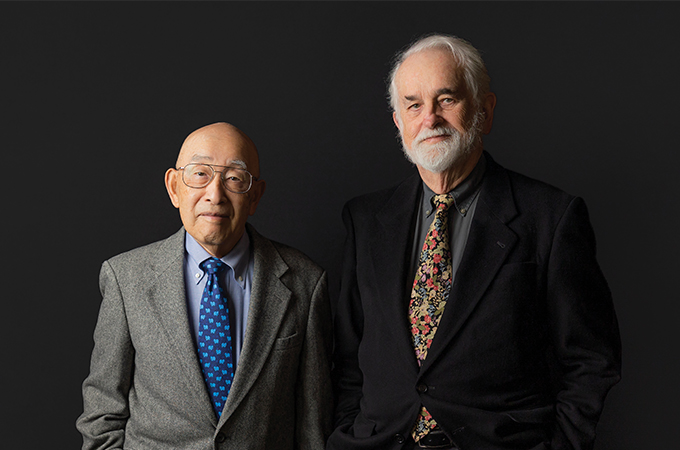
Both professors stay connected to alumni from the Johnston community. Owada participates in weekly Zoom calls with about a dozen Johnston College graduates from the late 1970s and early 1980s. One of McDonald’s favorite Johnston practices of lifelong learning is the alumni seminars, funded in part by the late Kathryn Green ’76, “where we are reading, writing, and thinking together.”
Owada and McDonald have both included a provision in their estate plans for the Johnston Founders’ Chair in Alternative Education, which will add a faculty member to help continue the Center’s innovative approach.
Owada notes, “The chair will be very important to carrying the Johnston mission throughout the University.”
‘Students can truly direct their education’
When Thomas McClung ’69 attended Redlands, the Johnston Center for Integrative Studies was just beginning. Ten years ago, while serving on the Alumni Association Board of Directors, he received a campus tour that stopped at the Bekins/Holt complex. After that, McClung was “assigned” to Johnston, which he says was “the best thing that ever happened.”
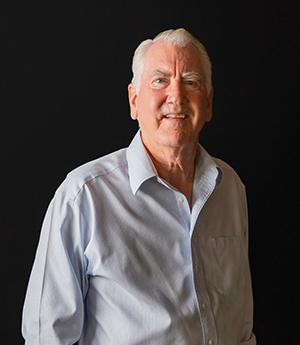
Over the last decade, McClung has formed great memories with Johnston, including three different May Term travel courses to Cuba, England, and Greece. “Johnston students were intently listening to the tour guides and asked terrific questions,” recalls McClung. “I was very impressed.”
As a regular participant in Johnston activities, including the 50th anniversary renewal in 2018, he has had the opportunity to meet new students and see the “huge difference” four years later. McClung believes students who didn’t thrive in traditional learning environments, such as his older brother, would have thrived at Johnston. “Students can truly direct their education,” says McClung, “and it would have been a place for someone like him to fit in.”
McClung serves as chair of the George P. Cortner Heritage Society, which honors individuals who have included the University as part of their estate plans or other deferred gifts. His own legacy commitments include a provision for the Johnston Founders’ Chair in Alternative Education and a cross-cultural travel grant endowment for Johnston students, named after his parents, Charles E. and Frances B. McClung.
“Endowments are the most important way to make sure funding will be there in the future,” says McClung. “Johnston is very important, and this ensures it will continue as a shining example of excellence and innovation at the University."
Explore the Spring 2022 issue of Och Tamale magazine.

